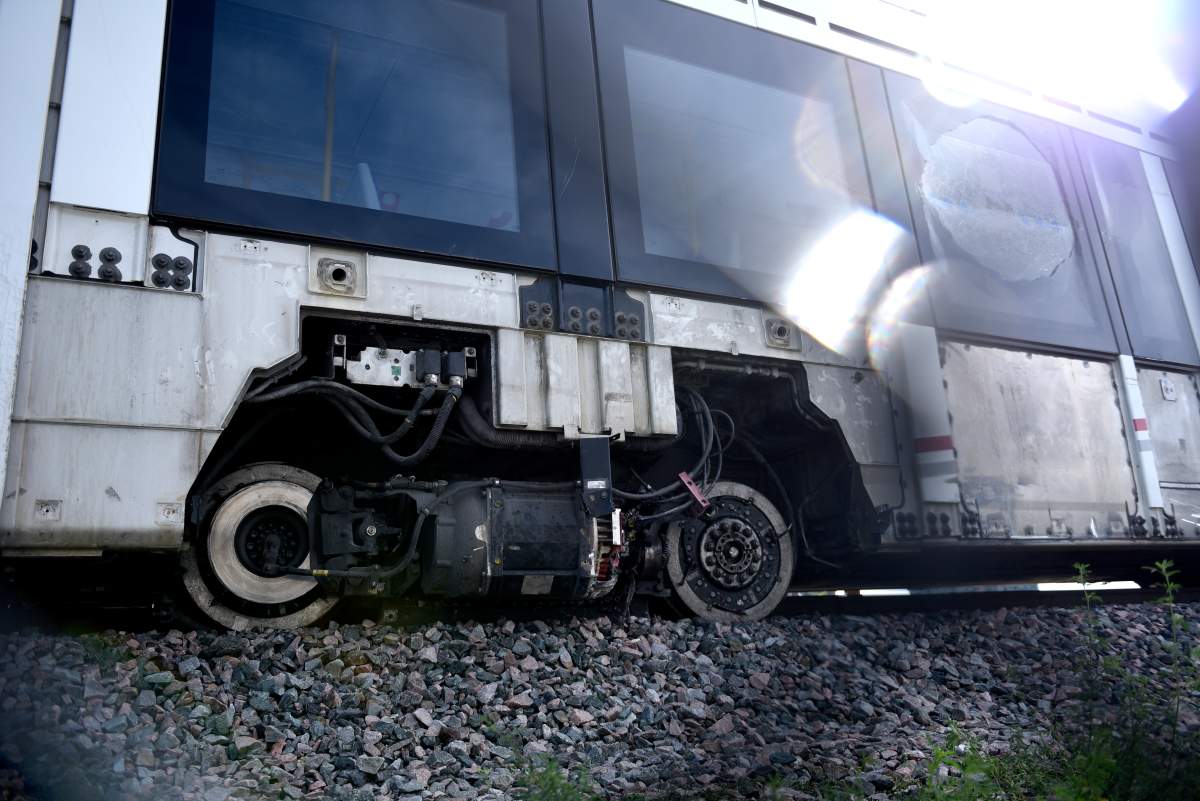The CEO of Rideau Transit Group’s maintenance arm pointed to human error as the cause of the latest derailment on Ottawa’s light-rail transit line Wednesday as councillors and transit commissioners attempted to hold the LRT operator’s feet to the fire over the ongoing service disruption.

Officials from RTG and TRA, Ottawa’s hired rail safety experts, were on hand at Wednesday’s transit commission meeting to answer questions about the LRT return-to-service plan following the Sept. 19 derailment.
RTG says the cause of the incident, which has now kept trains off the Confederation Line for a full month, were improperly torqued bolts on a gearbox that came loose from the derailed bogie.
Kitchissippi Coun. Jeff Leiper asked Rideau Transit Maintenance CEO Mario Guerra about the “human resources” behind the loose bolts during the meeting.
Guerra said the source of the error was a “shift change,” where a task was assumed to be done but it wasn’t. RTM is reviewing training and quality controls to ensure similar issues aren’t overlooked in the future, he added.
Speaking from more than four decades working in rail operations, TRA’s chief executive Kenneth Korach said that improperly torqued bolts have been a “significant issue” in systems worldwide and is one that can escalate to “more serious safety issues.”
“It’s important to keep in mind that if a bolt is improperly torqued, it leads us and other professionals to believe, what else is going on? Are there other issues related to the training of people, relative to the quality of procedures … that would allow that to occur?,” he told the transit commission.
Among the details of the return-to-service plan, which largely involves increased inspections to the fleet and oversight on the system in general, is a pledge from train manufacturer Alstom to “uplift competencies” in its team working on the system.
The promise fell flat for Somerset Coun. Catherine McKenney, who said it was “gobsmacking” that RTG’s subcontractor was bringing a more competent team to the system after “two years of constant dysfunction.”

Ottawa’s outgoing transit boss, John Manconi, had said the city should focus its continued probe into the LRT system’s failures on “Alstom, Alstom, Alstom” in his parting message to city council.
“Is Alstom to blame for what’s happening on our system, or is it that you didn’t know how to build a system?,” McKenney asked Guerra on Wednesday.

Get daily National news
The RTM chief executive acknowledged there had been “challenges” in the first two years of the Confederation Line, which he characterized as standard “startup issues” for systems around the world.
But in this case, Guerra said the cause of the Sept. 19 derailment was an issue of “workmanship,” not technical or design issues.
“For that, I think everyone’s to blame: RTG, RTM, Alstom,” he said.
Guerra added that since Alstom acquired Montreal-based Bombardier’s rail business earlier this year, the subcontractor has been able to bring in employees from the Canadian trainmaker to boost its on-the-ground headcount by as much as 70 per cent.
“Alstom has brought an army of people to Ottawa,” he said.
Speaking to reporters after transit commission on Wednesday, Guerra clarified that the extra workers brought in are being pulled from other projects in Ontario and are considered “temporary” as it’s working to restart service on the Confederation Line, but said the company is also looking at a need for a bigger workforce on a longer-term basis.
Among the most significant concerns from councillors and commissioners was the fact that the train derailed, entered and left Tremblay Station without the operator knowing a bogie was off the tracks.
Leiper said he was “disturbed” that there were no sensors on the train immediately flagging that the train was off the tracks.
Guerra said that’s one of the solutions that RTM is exploring, whether there’s additional technology, tools or operator training that could be implemented to keep a closer eye on derailments.
While RTG’s return-to-service plan indicates a partial restart date of Nov. 1, Guerra said that seven trains will be “available” that date, but that having customers on the Confederation Line again will likely require two to three days of testing past that date.
But RTG’s trustworthiness was called into question by transit commissioner Sarah Wright-Gilbert, who said that the consortium has offered increased oversight and inspections in the past but issues keep cropping up on the system.
“We’ve heard this story before, but now it’s a serious safety issue,” she said, referencing the most recent derailment with 12 passengers on board. “I don’t trust RTG to do what you say you will do.”
Guerra said that he recognized that the only thing that will restore rider confidence in the system is being able to consistently run trains on the Confederation Line, but said he could only promise for now that RTG and its subcontractors are “100-percent committed” to provide “safe, reliable service.”
In the meantime, Ottawa’s transit system is marked by crowded and cancelled buses as OC Transpo prioritizes R1 replacement service during LRT’s extended downtime.
The transit commission moved to increase the length of bus transfers by an extra hour to ease the stress of riders on the strained system, though the proposal will require council’s approval staff said such a change could take a month to implement.
McKenney also flagged an auction from a Metro St. Louis public surplus site where the city could potentially snag 11 used buses, eight listed as operational, to supplement R1 service for a low price, even offering to buy the buses with their own credit card if OC Transpo weren’t interested.
Staff said they would look into the auction, which is set to close in five days.



_848x480_1397405763961.jpg?h=article-hero-560-keepratio&w=article-hero-small-keepratio&crop=1&quality=70&strip=all)



Comments
Want to discuss? Please read our Commenting Policy first.